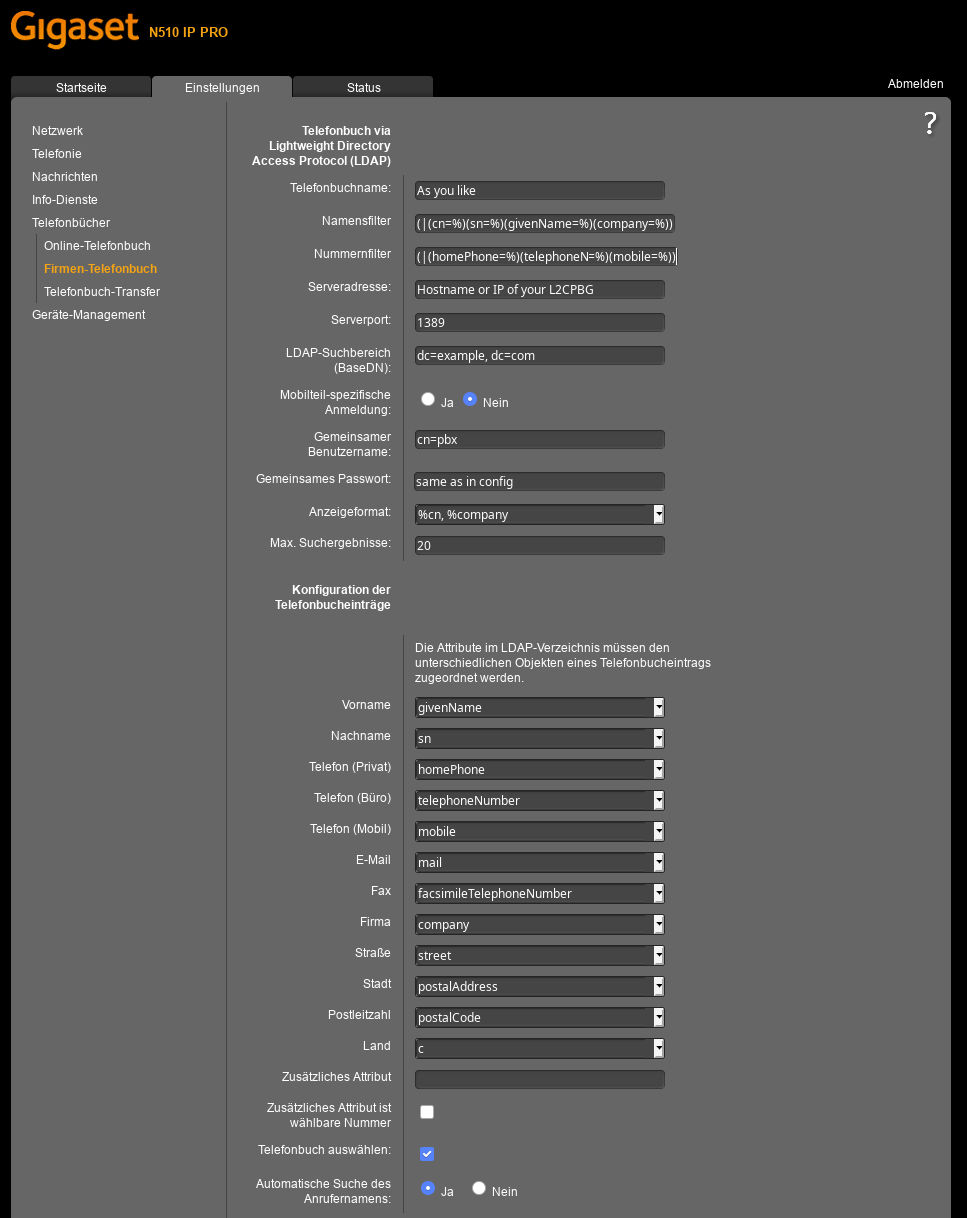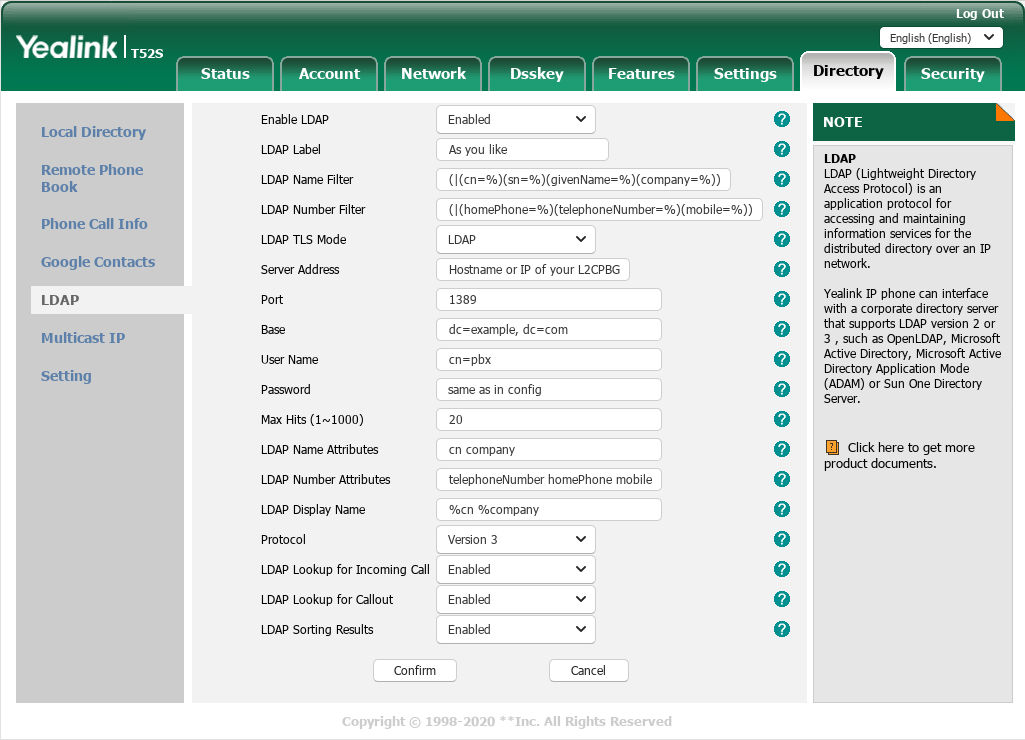0.7.0
closedLDAP-2-CardDAV Phone Book Gateway (l2cpbg)¶
An LDAP to CardDav (1 way read) Phone Book Gateway.
Use case¶
Most modern (business) voice phones have the capability to do comfortable LDAP directory look-up like:
- Directory search by alphabet letters
- Reverse lookup for inbound calls
- Reverse lookup by entering parts or the phone number
Unfortunately, most of the 'smaller' companies (i guess companies beyond 100 employee) don't have an 'enterprise' LDAP directory, much less than private persons.
Most of such companies do have something like a cloud address book, often based on WebDAV / CardDAV (i.e. Nextcloud, Ownlcoud, ...).
This is, where this Gateway might make your live easier (hopefully).
If this program get started on some kind of hardware (Windows, Mac, Linux, ???), it will do the following:
- Answer on LDAP requests from your voice phone(s)
- Ask your CardDAV (Nextcloud, Owncloud, ...) Server for the LDAP requested phone book entry
- Return the CardDAV query results, back as LDAP results to your phone.
Features¶
- Query your CardDAV address book(s) by entering the alphabetic letters (or parts of the telephone number) in your (LDAP capable) phone (and dial one of the matching numbers).
- Reverse lookup inbound calls and display matching contact informations on the phone.
- Work with human formatted (non- E.164) CardDAV entered phone numbers like: '040-123456' or '001 807 1234567' as well as '+49 (0)40 1234567-8'.
- Reverse lookup of phone numbers, depend on a tiny caching layer and thus there's a (configurable) sync interval/delay.
Usage¶
You need some kind of 24/7 machine where this gateway live. Windows, Linux, Mac, (ARMx might come later if someone is interested).
In this early 'beta' version, it runs in foreground. So, if you require to log off out of your machine, run it i.e. via 'screen'.
No installation required. Only a simple executable. Place it wherever your like. But I advice to start it as normal (non-root, non-administrative) user.
It will look for a configuration file in the following places (in the given order):
- ./.l2cpbgrc (or in it's parents)
- $HOME/.l2cpbgrc
- $HOME/.config/l2cpbg
- /etc/l2cpbgrc
- and some more uncommon places
Configfile syntax¶
The config file syntax is 'ini' based. Following a quick minimal sample:
; Comments get started with a semicolon
;
; The Gateway will act/listen as LDAP Server with the following settings
;
[ldap]
host = 0.0.0.0
;port = 1389
base = dc=example, dc=com
[ldap.bind]
dn = cn=pbx
pass = your-password
[dav]
server = https://cloudserver.example.com/remote.php/dav
user = cloud-login-name
pass = cloud-login-password
;addressbooks = regular-expression-of-lookup-adressbook
syncinterval = 5 ; Minutes
;[dav.map]
; tel = TEL
[location]
int = 1
area = 807
maxarealength = 7
language = en
[log]
conslevel = verbose ; Console log level. Might be one of silly, debug, verbose, info, warn or error
;filename = ./l2cpbg.log
;filelevel = info ; File log level. Might be one of silly, debug, verbose, info, warn or error
Config file description¶
[ldap] = LDAP Server settings¶
host : Which IP to listen for LDAP requests. Defaults to '127.0.0.1' (=localhost). '0.0.0.0' means: 'Listen on all interfaces'. You've to point your LDAP phone settings to this machines IP/hostname.
port : Port to listen for LDAP requests. Defaults to port 1389. You normally don't need to change this.
base : This LDAP's 'base DN'. Choose whatever you want, but use the same settings within your phone's LDAP settings. Defaults to 'dc=example, dc=com'.
[ldap.bind] = LDAP auth settings¶
dn : Distinguish name. Name, how the phone has to log into/authorize to the gateway.
pass : Related 'dn' password, a phone has to use when logging in/authorize to the gateway.
[dav] = WebDav/CardDav server settings¶
server : Your WebDAV/CardDAV server address/URL. Please see 'Limitations'!
user : WebDav username with read access to the relevant addressbook which shall be requested for phone book lookups. Might also be a 'shared' address book.
pass : Related user password.
addressbooks : Optional regular expression of matchable addressbook(s) used for phone book lookups. If unsure, enter something. l2cpbg will log all found address books of the logged in CardDav user during startup and log them as 'Non-matching' or 'Matching' address book(s).
[dav.map] = CardDav mapping¶
tel : CardDAV attribute which contain the phone numbers. Normally (and by default) 'TEL'.
[location] = Local area settings¶
int : International area code (1 = North America, ..., 44 = United Kingdom, 49 = Germany, ...) of your location.
area : Local area code without leading 0 (20 = London (UK), 40 = Hamburg (DE), ...).
maxarealength : Longest possible length of a telephone number within your local area. If a found or received number is shorter or equal, it's identified as a number without local area prefix.
country : Two-letter ISO 3166-1 alpha-2 country code (i.e. US, GB, DE, ...).
[log] = Screen & file logging¶
conslevel : Console log level. Might be one of silly, debug, verbose, info, warn or error. Defaults to verbose.
filename : Log messages to this file. Might contain '%DATE%' with will be replaced by YYYYMMDD. Defaults to empty = no log file.
filelevel : File log level. Might be one of silly, debug, verbose, info, warn or error. Defaults to info
The log levels are organized as follows:
silly : This is the most verbose log level. It logs simply everything. Never use it in production environment as it might produce an awful amount of log entries!
debug : Logs a lot internal stuff, probably interesting when searching a solution for an issue. Should not be used in production environment as it produce also a lot log entries!
verbose : Logs everything which might be interesting during use. Not only results, also when something get started, detailed results and such things.
info : This is the most usual log level. Logs only stuff which is relevant.
warn : Logs stuff which doesn't behave as expected. Not critical (generic functionality should be okay) but should be noticed/checked.
error : Something essential/critical happened. Functionality is limited or aborted at all.
[ldap.map...] = LDAP/CardDav mapping¶
Every LDAP attribute which is used within a phone(s) filter or response, need to have a corresponding CardDav mapping.
This get done as follows:
First you need to defined a separate block for the LDAP attribute in the following syntax:
[ldap.map.<ldap attribute name>]
Within such a LDAP mapping block you have to define:
dav : Corresponding CardDav field/attribute name.
and may defined the following optional settings:
types : Regular expression of relevant CardDav types.
index : Zero based index in the case of a multi-value CardDav field.
For an overview of the predefined/default LDAP/CardDav mappings, take a look into the 'config.sample' file.
Phone configuration¶
Gigaset¶
Here's a configuration sample of a Gigaset N510 IP PRO:

Take attention that Server Address point to the machine where this gateway lives, as well as Serverport, BaseDN, Common User Name and Common Password get filled with the same values as defined in your L2CPG config file.
Yealink¶
Another configuration sample of a Yealink SIP-T52S:

Take attention that Server Address point to the machine where this gateway lives, as well as Port, Base, User Name and Password get filled with the same values as defined in your L2CPG config file.
Compatibility¶
This early version is currently only tested (working) with:
- CardDAV Server:
- Nextcloud version 13, 15 & 16
- Phone Extensions:
- Gateway Host OS:
Limitations and Known Issues¶
There are already some known issues!!! Not sure which will get fixed, might depend on how much people are interested in.
- The LDAP Server doesn't support LDAPS (encrypted LDAP communication) at the moment. Therefore it should not be used in an untrusted network!
- The CardDAV Server HTTP-Authentication is currently restricted to 'Basic Authentication'. No 'Digest Access Authentication' like required i.e. for Daylite.
- 'Basic Authentication' over 'HTTPS' will work (for sure), but without detailed certificate checking.
- In this first 0.7.0 version, there's no cacheing layer anymore (as in the previous versions). This might result in LDAP timeouts if your CardDav server is to slow or laggy. If you get hit by this limitation, drop me a short note, so that I'll give it priority.
To-Do¶
I already have a couple of To-Do's on my list. Following a (priority ordered) list. Feel free to drop me your wishes #support.
- Implement Apple's addressbook extension for Apple specific telephone number X-Attributes
- Implement a new cacheing layer for quicker LDAP lookups
- Daemonize (run in background/as service)
Support & getting help¶
For getting help or discussing l2cpbg, please browse the L2CPBG Forum or check/open the Tickets area.
Also available in: TXT